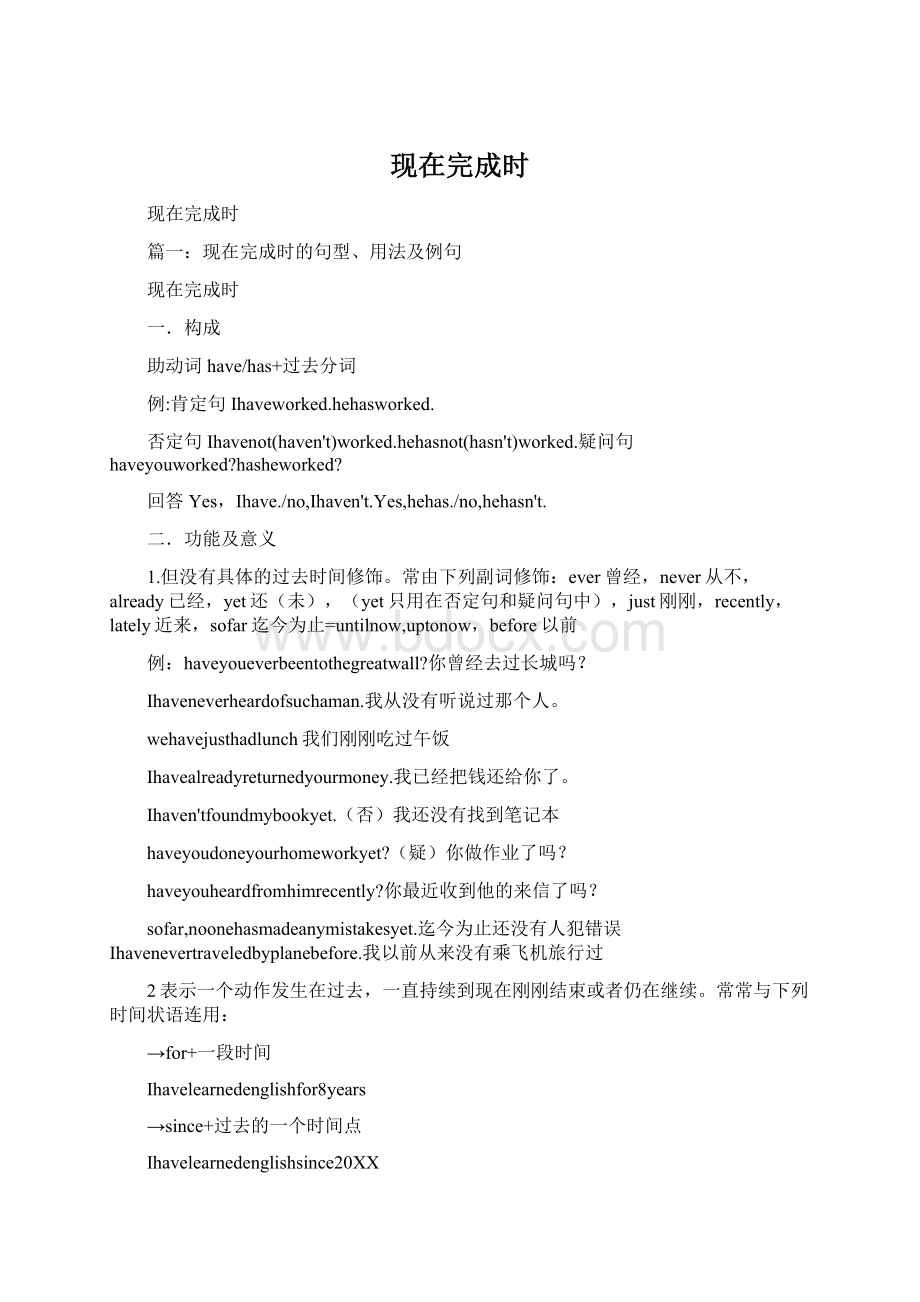现在完成时Word文档格式.docx
《现在完成时Word文档格式.docx》由会员分享,可在线阅读,更多相关《现在完成时Word文档格式.docx(15页珍藏版)》请在冰豆网上搜索。

sofar,noonehasmadeanymistakesyet.迄今为止还没有人犯错误Ihavenevertraveledbyplanebefore.我以前从来没有乘飞机旅行过
2表示一个动作发生在过去,一直持续到现在刚刚结束或者仍在继续。
常常与下列时间状语连用:
→for+一段时间
Ihavelearnedenglishfor8years
→since+过去的一个时间点
Ihavelearnedenglishsince20XX
→since+一段时间+ago
Ihavelearnedenglishsince8yearsago
→since+时态为一般过去时的时间状语从句
IhavelearnedenglishsinceIwas5yearsold
→inthepast/last+时间段
wehavehadtwoenglishexamsinthepasttwomonths近两个月来我们进行了2次英语考试
greatchangeshavetakenplaceinmyhometowninthepasttenyears近十年来我的家乡发生了巨大的变化。
三延续性动词与短暂性动词的用法
?
现在完成时中,与一段时间连用时应注意句中的谓语动词须是延续性动词,非延续性动词不可和一段时间连用。
我离开这所学校已经八年了。
误:
Ihaveleftthisschoolforeightyears(×
)
他借用我的词典已经两天了
hehasborrowedmydictionaryfortwodays(×
非延续动词与一段时间连用时,可做相应转化
因此?
中例句正确形式分别为
正:
Ihavebeenawayfromthisschoolforeightyears(√)
hehaskeptmydictionaryfortwodays(√)
其它非延续性动词与时间段连用时的变形
buy→haveborrow→keep,
fallasleep→beasleepleave→beaway
begin→beondie→bedead,
join→bein或beamemberofreturn→beback
come/arrive→beingetup→beup,
marry→bemarriedcatchacold→haveacold
在否定句中短暂性动词可与段时间连用
tgonetoseehimforseveralmonths(我已经好几个月没有去看他了)Ihaven'
tboughtanythingfortwomonths
四区分
havebeento+地点;
表示去过某个地方(已经回来),常与ever,never,几次,等连用
havegoneto+地点:
表示到地方去了(还没回来)
havebeenin+地点:
表示到了某个地方(多久了),常与for+段时间连用
比较:
hehasbeentochinatwice(曾经去过,现在不在中国)
hehasgonetochina他到中国去了.(他可能已在去中国的路上,或已到中国,总之,现在不在这里)
hehasbeeninchinafortwoyears(他到中国已经两年了)
五对完成时的提问用howlong.....?
不能用when...?
六现在完成时常用句型
1Itisthefirst/secondtime....that....结构中的从句部分,用现在完成时
ItisthefirsttimethatIhavevisitedthecity
这是我第一次参观这座城市
Itisthethirdtimethattheboyhasbeenlate
这是这个男生第三次迟到了
2Thisisthe...that..结构,that从句要用现在完成时
ThisisthebestfilmthatI'
ve(ever)seen
这是我看过的最好的电影
ThisisthefirsttimethatI'
veheardhimsing
这是我第一次听他唱歌
3Itis/Ithasbeen+时间段+since...
Ithasbeen/It'
s5yearssincewelastmet.
自从上一次我们相遇到现在已经是五年了
It'
s/Ithasbeen3monthssincethemandied那人死去3个月了
4一段时间+完成时结构+since引导的时间状语从句
TwoyearshaspassedsinceIcamehere.
七现在完成时和一般过去时的区别
现在完成时表示过去发生的某一动作对现在造成的影响或结果,强调的是现在的情况,所以它不能和表示过去的时间状语连用,如yesterday,lastnight,threeweeksago,in1998等。
而一般过去时只表示过去的动作或状态,和现在不发生联系,它可以和表示过去的时间状语连用
Ihaveseenthefilm我看过这部电影(我了解这部电影的内容)
Isawthefilmlastweek我上周看了这部电影(只说明shangxingqi
篇二:
现在完成时-教学设计(全英文超详细)
Ⅰ.Teachingaims:
1.Knowledge:
a.Thestructureofthepresentperfecttense.
b.Theusagesofpresentperfecttense.
2.Ability:
a.enablestudentstousethecorrecttenseintheirwritingandspeaking.
b.enablestudentstousetherightwordsinthepresentperfecttense.
3.Feelingsandattitude:
a.Letthestudentsknowtheimportanceofenglishgrammar.
b.Trytobuildupstudents’confidenceinthemselves
c.encouragestudentstospeakenglishinpublic.
Ⅱ.Importantpoints:
a.letthestudentsunderstandstheusagesofpresentperfecttense.
b.Thedifferencesbetweenpastsimpletenseandpresentperfecttense.
Ⅲ.Difficultpoints:
helpstudentsusepresentperfecttensewithverbstodescribeeventshappenataparticularpointintimeandtodescribeeventsthatcancontinueoveraperiodoftime.
Ⅳ.Teachingmethodology:
Thenewseniorenglishcurriculumstandardsaimseducationforallstudentsandstressedquality-orientededucation.Themaintaskofeducationistostimulateandcultivatestudents’interestandtheirconfidenceinlearningthelanguage,helpthemdevelopgoodlearninghabitsandformeffectivelearningstrategies,facilitateautonomyandcooperativespiritinlearning;
enablestudentstomasterbasicenglishlanguageknowledgeandskillsinlistening,speaking,readingandwriting.
Accordingtothenewstandards,thestudentsshouldbethecenteroftheclassandtheteacherservesasacontroller,organizer,participant,orresource-providermosttimes.consideredwiththecharacteristicoftheteachingcontentsandthelearners,Iwillapplyexplanationandpracticinginmyteaching.mostoftheusageswillbesummarizedbystudentsthemselves.
Ⅴ.Teachingaids
Acomputer,aprojector,blackboard,chalks
Ⅵ.Teachingprocedures:
step1.Revision&
lead-in(2min)
1.Invitestudentstoreadsentencesusingpresentperfecttensetheyhavefoundbeforetheclass.
s1:
I’veseenquitealotofchina.
s2:
I’vevisitedsomebeautifulcities.
s3:
Theyhavejustcompletedit.
s4:
...
2.showsomesentencesontheboard.
1).Theyhaveputupalotofhigh-risebuildingsrecently.
2).mywife’sjustboughtabeautifuldressfromoneoftheshopsthere.
3).It’sgotsomereallyprettyparks.
4).Afriend’stoldmeaboutanicefishrestaurant.
step2.presentperfecttense
1.Thestructureofpresentperfecttense.
Afterreadingthesesentences,askstudentstofindthestructureofthesesentenceswithpresentperfecttense.
1).have/has+done
2).have/has+not+done
3).have/has+been+done
2.Theusageofpresentperfecttense
playtheflash(apigandhismom),andtellstudentstorecallthemainusagesofthistense.
Q:
thestoryhappensinthepast,butthepigandhismomusepresentperfecttensetodescribeit,canyoutellmethereason?
Drawatimelineontheblackboard:
1).usage1:
“完成用法”
①强调过去发生的动作对现在造成的影响或结果,常用状语有:
already,yet,never,ever,just,before...
e.g.1.Ihavejustcleanedmyhands.
e.g.2.Ihavelostmywallet.
e.g.3.Ihavealreadyfinishedmyhomework.Iamfree.
②showthefollowingsentencesandhavestudentssummarizethedifferencebetweenthepastsimpletenseandpresentperfecttense.
hehasalreadyreadthatbook.(说明他现在知道那本书的内容)
hereadthatbooklastyear.(只说明他去年读过那本书)
hehasgonetoAmerica.(他现在不在此地,在美国)
hewenttoAmericaeightweeksago.(只说明他去过美国)
summary:
一般过去时表示过去发生的动作或存在的状态,与现在情况无关,常用时间状语为yesterday,lastyear,inthepast等,而现在完成时与现在有关。
③showtwopicturesandguidestudentstodescribethemwithpresentperfecttense.
e.g.1.hehasjustlosthisjob.
e.g.2.shehasjustgottheletter.
2).usage2:
“未完成用法”
表动作或状态已开始,持续到现在,可能还会继续进行下去,常用时间状语since+时间段ago/时间点/从句,for+时间段,sincethen,eversince,sofar,uptonow.
e.g.1.Ihavelivedheresince20XX.
e.g.2.Ihavestudiedenglishforsevenyears.
e.g.3.uptothepresenteverythinghasbeensuccessful.
e.g.4.hehasstayedheresince5hoursago.
step3.Twokindsofverbs
1.Thedefinitions
1).Leadinthispartbyaskingstudentsaquestion:
thepigsaid“It’sdiedforacoupleofdays”first,thenhechangeditto“It’sbeendeadforacoupleofdays”,doyouknowthereasonwhythefirstsentenceiswrong?
现在完成时的未完成用法只适用于延续性动词,短暂性动词的现在完成时的肯定式不能和表示一段时间的状语连用。
2).showtwogroupsofwordsandleadstudentstogetthedefinitions.
①短暂性动词:
表示短暂的运动状态(瞬间完成或延续时间很短的动词).(start,begin,come,go,leave,arrive,reach,join,marry,open,close,give,lend,borrow,finish,break,see,hear,notice,find,understand,die...)
②延续性动词:
表示持续的行为或状态的动词,能和表示一段时间的状语连用.(be,keep,have,live,study,work,teach,stay,read,play,fly,talk,rain,run...)
2.Replacementofthesetwokindsofverbs
helpstudentsknowthecorrespondingverbofverbdescribingeventshappenataparticularpointintimewithagroupofcorrectionexercises.
1)shehasboughtthecomputerfortwoyears.(buy---have)
2)Annhasgonetochinasincesixmonthsago.(come/goto---bein;
leave---beaway)
3)mybrotherhasjoinedthearmyforfiveyears.(join---bein/amemberof)
4)Ihaveborrowedthedictionarysince3daysago.(borrow---keep)
5)Thefilmhasbegunfor10minutes.(begin/start---beon)
6)Thematchhasfinishedforhalfanhour.(finish---beover)
7)hisdoghasdiedfortwoyears.(die---bedead;
marry---bemarried)
step4.exercises
showtheexercisesontheboardandhavestudentsdothemtogether.
1.Theoldworker_____inourfactoryfor30years.
A.hadworkedb.hasworkedc.workedD.works
2.It___tenyearssincethey____toFrance.
A.was;
movedb.was;
havemovedc.is;
hasmovedD.is;
moved
3.---howareyoutoday?
---oh,I____asillasIdotodayforaverylongtime.
A.didn’tfeelb.wasn’tfeeling
c.don’tfeelD.haven’tfelt
4.Itisthethirdtimeyou__latethisweek.
A.hadarrivedb.arrivedc.havearrivedD.arearriving
5.we_____morethan3000treesinthepastthreeyears.
A.plantb.plantedc.hadplantedD.haveplanted
6.mr.wangisn'
there.he_____thestationtoseehisfriendoff.
A.hasbeeninb.hasbeento
c.hasgoneinD.hasgoneto
7.---___TomandLucy___married?
---Foraboutthreeyears.
A.howlonghave;
been
b.howlonghave;
got
c.howlongwere;
being
D.howlongdid;
get
step5.summary&
homework
1.summary.
Afterfinishingtheexercises,letseveralstudentsstandupandrepeatwhattheyhavelearnedthisclass,thenifnecessary,theteacheraddssomethingtheymissed.
2.homework
completetheactivity2onpage34,andthegrammarpartintheexercisebook(page43).
篇三:
现在完成时讲解及练习
1.概念:
过去发生或已经完成的动作对现在造成的影响或结果,或从过去已经开
始,持续到现在的动作或状态。
2.时间状语:
recently,lately,since…for…,inthepastfewyears,etc.
3.基本结构:
have/has+done4.否定形式:
have/has+not+done.
5.一般疑问句:
have或has提前
对于初接触现在完成时的人来说,往往会产生一种茫然,因为它似乎与一般过去
时相似。
那就是,这两种时态描述的动作都始于过去。
其实不然,现在完成时主
要表示,发生在过去的动作延续到现在刚刚完成、或许还要延续;
侧重于这个动
作对现在带来的结果、产生的影响、积累的总和等等。
而一般过去时则只不过是
表示动作发生在过去的什么时候。
弄清了这一区别,就很容易理解现在完成时了。
它主要适用于下面的几种情况:
1)表示截止现在业已完成的动作
bynow,IhavecollectedallthedatathatIneed.到现在为止,我已收集到了我
所需的全部资料。
shehasread150pagestoday.她今天已看了150页。
2)表示发生在过去而对现在产生影响、带来结果的动作
haveyouhadyourdinner?
你吃晚饭了吗?
3)表示过去发生的动作持续到现在,并可能还要延续
Ithasbeenfiveyearssincehejoinedthearmy.他参军五年了。
1)一个句子应该用什么时态只能取决于它需要表达的意思,以及它所处的语
言环境。
例如:
hespeaksenglish.(一般现在时,说明动作发生的经常性。
hespokeenglishwhenhewasinnewZealand.(一般过去时,说明动作发生
的时间。
heisspeakingenglish.(现在进行时,说明动作正在进行。
hehasspokenenglishforthreeyearssincehecametotheusA.(现在完成时,
这里说明动作的总和。
hehasbeenspeakingenglishsincehecametotheusA.(现在完成进行时,
强调动作的连续性。
2)在含有时间状语从句或条件状语从句的主从复合句中,如果主句的谓语
动词是一般将来时,那么从句的谓语动词就只能用一般现在时来表示将来时;
如果主句的谓语动词是过去将来时,那么从句的谓语动词就只能用一般过去时
来表示过去将来时。
Iwillnotplaytennisifitrainstomorrow.
Iwouldnotplaytennisifitrainedthenextday.
3)有些动词表示无法持续的动作,它们一般不宜用于进行时态中。
这类动
词常见的有:
be,believe,consist,find,forget,hate,have,hope,hear,know,
like,love,notice,prefer,remember,see,seem,smell,suggest,taste,
understand,want,wish,sitdown,standup等等。
be动词若是用于进行时态,可表示暂时、短暂的情况或表现。
Tomisbeingagoodboytoday.汤姆今天很乖。
heisbeingchildish.他这样做是耍孩子气。
Youarenotbeingmodest.你这样说不太